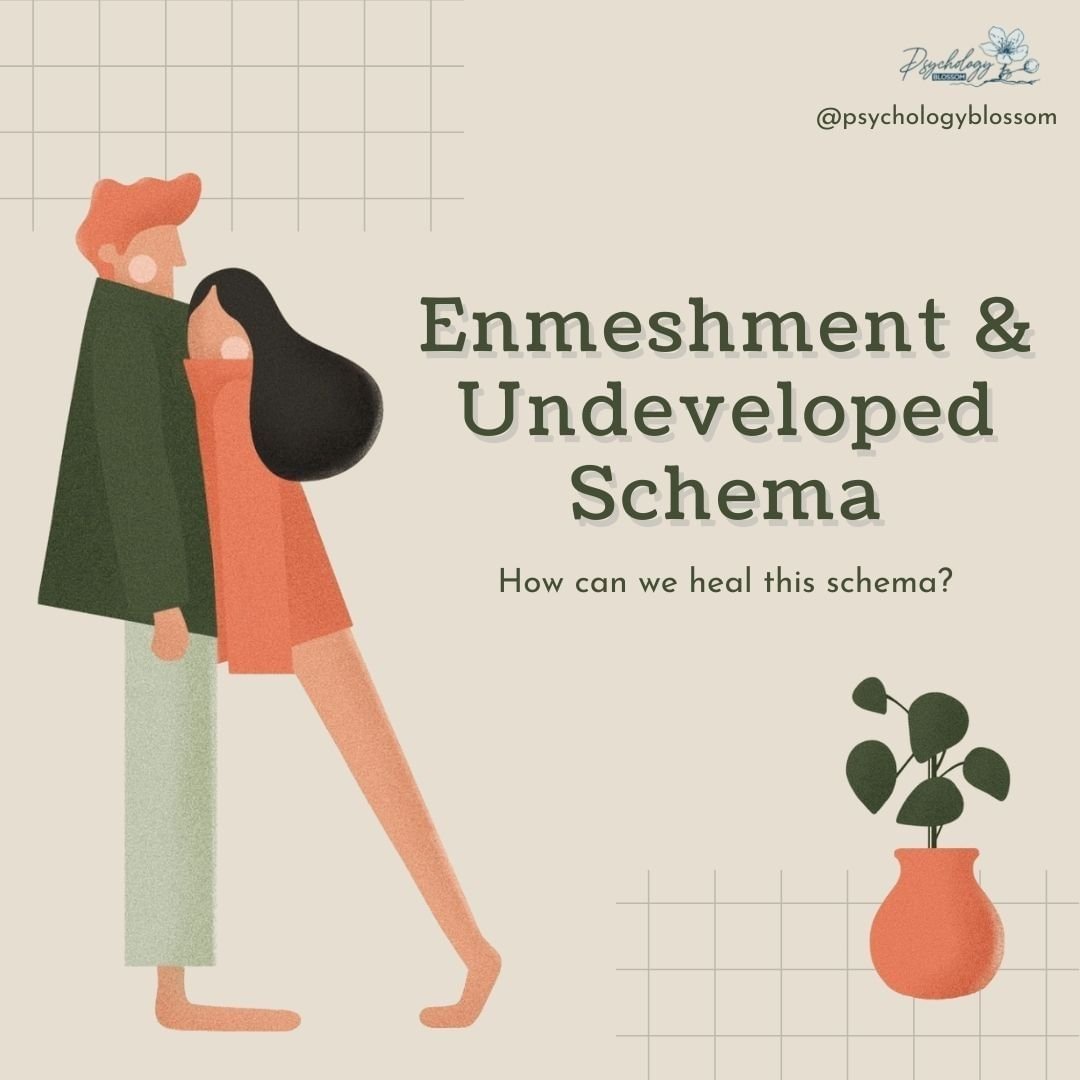Enmeshment & Undeveloped Self Schema: Finding Your Own Identity
Do you feel that you are losing sense of who you are?
Do you feel that some of your identity is merged with someone else?
Do you feel that you cannot survive without this person?
These experiences often indicate the Enmeshment & Undeveloped Self Schema — an excessive emotional involvement with someone close to you. This could be a parent, sibling, spouse, or friend. A common example is an overly close mother-daughter relationship where both parties rely heavily on each other for emotional stability, advice, and validation.
While closeness and intimacy are valuable parts of healthy relationships, they should not come at the expense of forming one’s identity, independence, and capacity to build a range of fulfilling relationships. Enmeshment keeps individuals tied to others’ needs and emotions while leaving their own development stunted.
Signs of an Enmeshment Schema
Individuals with this schema may feel obsessively attached to another person, aligning their thoughts, behaviours, and emotions with them. This results in a poor sense of purpose, lack of autonomy, and confusion about identity. Some common signs include:
- Feeling obliged to share intimate details with others, even when it feels uncomfortable
- Relying on feedback and advice from another person before making personal decisions
- Wondering who you truly are outside of the relationship
- Being unable to describe your identity independent of others
- Clinging to others and being overly sensitive to rejection
- Absorbing or being strongly affected by the emotional states of others
- Adapting your needs, goals, and desires to fit the expectations of others
Over time, these patterns prevent personal growth, leading to low self-esteem and difficulty functioning independently. Individuals may feel empty when alone and anxious at the thought of separation.
Reactions from the Enmeshment Schema
When the Enmeshment Schema is triggered, people often react in one of three ways:
- Surrender: Sharing everything with the person they are enmeshed with and relying completely on them for help, guidance, and validation.
- Avoidance: Steering clear of opportunities for intimacy or vulnerability out of fear of further loss of self, sometimes leading to isolation.
- Overcompensation: Pretending not to need people at all, rejecting closeness, and insisting on extreme independence, which may come across as cold or detached.
How Enmeshment Develops
This schema usually forms in childhood. It can occur when parents are overly involved in a child’s life, discouraging autonomy. Children may learn that separating or asserting independence is wrong, selfish, or unsafe. In some cases, parents use children to fulfill their own emotional needs, blurring boundaries between caregiver and child.
For example, a child who is made to act as a parent’s confidant may grow up believing they must always prioritise others’ emotions. As adults, these individuals may replicate the same patterns with partners, friends, or colleagues, constantly defining themselves in relation to others rather than cultivating their own identity.
Impact of the Enmeshment Schema
The consequences of this schema can be profound:
- Difficulty forming a clear and stable identity
- Problems in relationships, often marked by dependency or fear of abandonment
- Anxiety or depression linked to a lack of personal fulfillment
- Suppressed individuality, creativity, or personal goals
- Feeling resentful yet unable to establish boundaries
Without intervention, this schema can perpetuate cycles of unhealthy attachment, making it difficult to achieve a sense of independence and self-worth.
Schema Therapy
Schema Therapy is a highly effective treatment for the Enmeshment & Undeveloped Self Schema. This approach helps individuals understand the root of their dependency, reframe their beliefs, and strengthen their sense of self. Therapy also focuses on balancing closeness with healthy boundaries, enabling independence without guilt.
Therapy aims to help individuals:
- Understand their relationship patterns with enmeshed figures
- Reduce the guilt-inducing inner critic that discourages independence
- Discover their own unique identity — including preferences, opinions, talents, and goals
- Learn to set and maintain healthy boundaries without fear of rejection
Through imagery rescripting, role-play, and behavioural experiments, clients gradually learn to assert themselves while maintaining loving connections. They gain confidence in making independent choices and begin to feel more grounded in who they truly are.
We recommend This Video to those who want to learn more about the Enmeshment & Undeveloped Self Schema.
About Us
We are a team comprising psychologists based in Singapore endeavouring our best to prioritise our clients’ needs. When you embark on this journey with us, we take a collaborative approach where you and your psychologist work closely together, and listen to what you have to say — No judgments, and in a safe space. Meet our Team
Quick Links
Contact Us
150 Cecil Street #07-02 S069543
Opening Hours
Monday to Friday: 8am to 6pm
Saturday: 8am to 2pm
Sunday: 10am to 2pm (Online only)
Admin Hours
Monday to Friday: 8am to 5.30pm
Saturday: 8am to 2pm
© Copyright 2023 – Psychology Blossom | Privacy Policy | Terms


